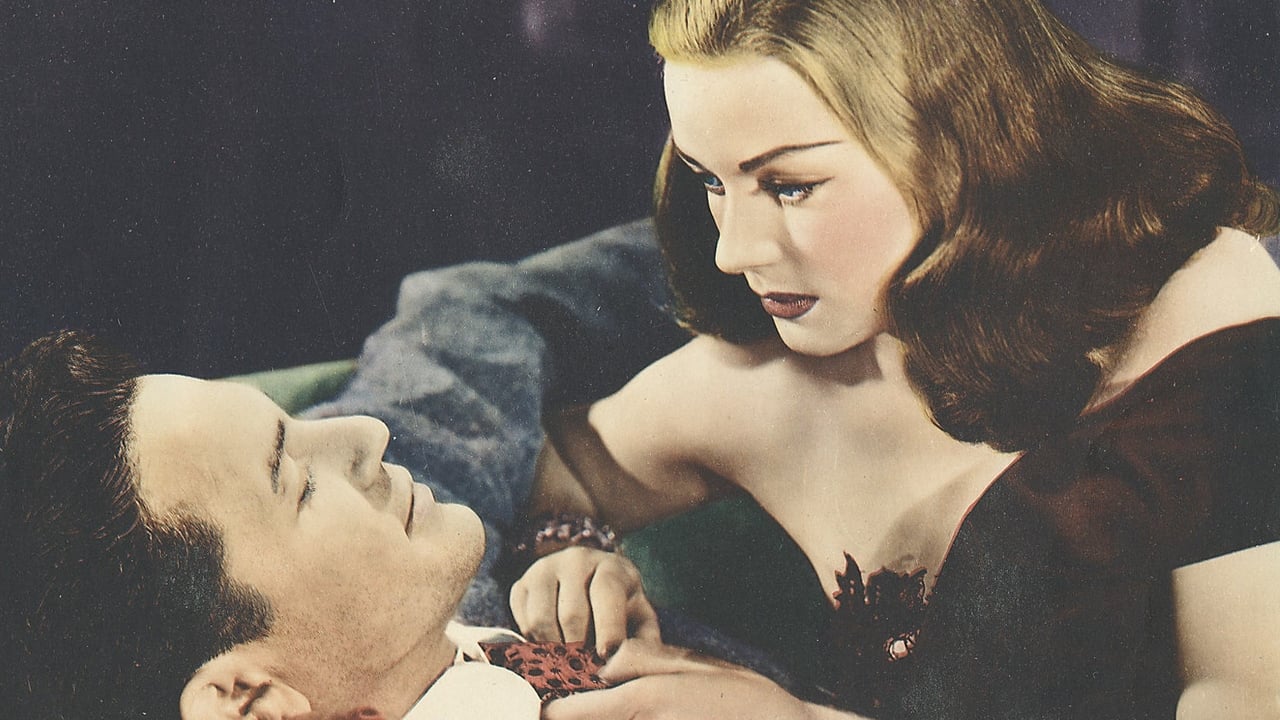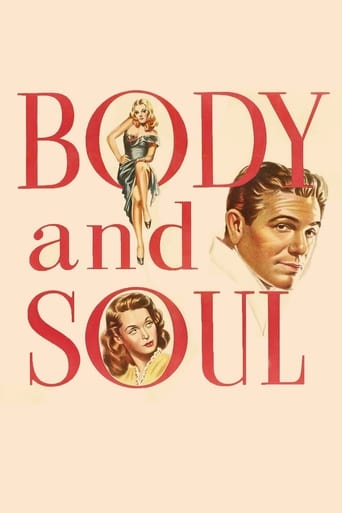Inclubabu
Plot so thin, it passes unnoticed.
filippaberry84
I think this is a new genre that they're all sort of working their way through it and haven't got all the kinks worked out yet but it's a genre that works for me.
Ortiz
Excellent and certainly provocative... If nothing else, the film is a real conversation starter.
Cissy Évelyne
It really made me laugh, but for some moments I was tearing up because I could relate so much.
seymourblack-1
"Body And Soul" is widely recognised as the first boxing movie to focus sharply on the corrupt nature of the fight game and the unethical practices of the people who run it. The ways in which a fighter gets exploited by gangsters and gambling interests are depicted very convincingly and the negative effects that sudden success can have on a young boxer are also portrayed in a style which is both powerful and authentic.The events that take place during the fighter's rise from obscurity to world championship level involve a great deal of intrigue, intensity and drama and no doubt, this is exactly what inspired so many other filmmakers to produce similar types of movies which frequently featured many of the same situations that are seen in "Body And Soul".Charley Davis (John Garfield) is a fighter from New York's lower East Side who's determined to escape the impoverished circumstances that he and his mother find themselves in after his father is accidentally killed when the speakeasy next to his candy store is bombed. Ignoring his mother's wishes, Charley decides to pursue a career in boxing.Charley's best friend Shorty Polaski (Joseph Pevney)had become his manager after convincing local trainer Quinn (William Conrad) to take Charley on and soon after, Quinn arranges a series of fights in which Charley is so successful that he attracts the attention of a gangster called Roberts (Lloyd Gough) who's the most powerful figure in the boxing business in New York. Roberts promises Charley a title fight but the cost is high as Roberts demands a 50% cut of Charley's earnings and the effective sidelining of Shorty.Roberts arranges a fixed fight for Charley against the ageing middleweight champion Ben Chaplin (Canada Lee) who has a blood clot on his brain. Charley is told nothing about his opponent's condition and after a punishing contest during which Ben takes a large number of blows to the head, his manager understandably feels double crossed by Roberts.Shorty is appalled when he discovers the circumstances surrounding the fight and after telling Charley what he knows, resigns. Tragically, he then gets beaten up by one of Roberts' henchmen and still groggy after his beating, staggers into the street where he gets run down and killed by a car.Peg (Lilli Palmer) had been Charley's loyal girlfriend since his earliest involvement in the fight game but after seeing what had happened to Shorty and becoming concerned about Roberts' activities, decided that she could no longer continue their relationship unless Charley decided to give up boxing. Predictably, Charley refused and then broke off their engagement.As Charley's success in the ring continues, he gambles heavily, becomes increasingly indebted to Roberts and starts seeing an acquisitive nightclub singer called Alice (Hazel Brooks). After an extended period as the champ, Charley is scheduled to fight a young contender in a fixed match which he's instructed to lose and to use his payment of $60,000 to bet against himself. How he deals with this situation proves to have significant consequences, not only for him, but also for Ben (who becomes his trainer) and Peg who starts to see a future for them together if Charley does finally give up boxing.The boxing sequences in "Body And Soul" were expertly filmed with hand held cameras being used to augment the work of the main camera crew and Francis D Lyon and Robert Parrish's contributions were recognised when they won the Oscar for "Best Film Editing". John Garfield's performance won him an Oscar nomination for "Best Actor" and Abraham Polonsky also received an Oscar nomination for his marvellous screenplay.John Garfield gives a top class performance as the naive fighter who's seduced by the promise of wealth into a corrupt business where, in order to hit the big time, he has to make a Faustian deal which costs him his lifelong friendship with Shorty and damages his relationships with Peg and his mother. Lilli Palmer is excellent as the warm hearted Peg who's more intelligent than Charley and also has higher ethical standards. The supporting performances are also very good with Canada Lee making a particularly strong impression.
sdave7596
"Body and Soul" released by United Artists in 1947, was apparently made after actor John Garfield got out of his Warner Brothers contract. He had made many films with them, but wanted to be more independent. In this film, Garfield plays Charley Davis, a lower middle class New Yorker with a talent for boxing. Not unlike many boxers, certainly of that time period, using your fists for sport was a way out of your meager background. While I have never been a big fan of John Garfield and did not consider him a top notch actor of the golden age of Hollywood, this part does seem made for him. Garfield is quite good here, playing the conflicted Charley with skill and credibility. There are actually few real boxing scenes in the film, except for the end, and that is why labeling this as a 'boxing movie' seems a bit deceptive. There are capable supporting players, including the lovely Lili Palmer, who loves Charley. Robert Conrad and Lloyd Gough ably play the tough guy thugs who want Charley to sell his soul for money. A notable performance by African-American actor Canada Lee is striking - considering this is 1947 and is treated as an equal by the white actors. Garfield was known for his politically liberal views, and perhaps this is why he later ended up as an enemy of the Communist witch hunters in Washington. Garfield's untimely death at age 39 was a shock to many - his funeral was mobbed by thousands. Perhaps this elevated his image above the work he left behind in film - but still, this film and a handful of others are quite good.
ipilowsk
Iloved this movie at the time. it seemed to be about real life in the USA and there weren't many movies like it at that time. The leads;Garfield and Palmer were superb,the former a graduate of Yiddish theatre, the latter a refugee from Hitler's Europe. the melodramatic roots were there from which 'the method' later grew, with performers like Brando, Dean and Poitier portraying the wounded and suffering hero.(Did Mel see this movie?} it also anteceded 'Marty' the quintessential realist U.S.struggling migrant antihero movie Where are you Paddy Chayevsky now that we need you? Perhaps what was most striking were the heroes who spoke articulately using words of more than two syllables, reaching its acme in 'Streetcar named desire' where Brando's character refers to 'The Napoleonic code' when he rages about his sister-in-law's possessions. Was the subversive element the depiction of working class heroes who could reason? and whose language had a poetic,almost Shakespearian ring to it? No longer the inarticulate (Tarzanic brute) but someone who could debate issues in the corridors of power: a noble and sexually attractive savage?
ccthemovieman-1
I looked at this as simply a good story, a solid drama that happened to have the sport of boxing figure into it. "Boxing movies." if people insist on labeling this under that category, were particularly popular around the time of this film. Many of them had similar stories about a good guy being told to take a dive or else. Yes, that was in here, too, but it wasn't anywhere near the central part of the story. This film was more of an earlier "Raging Bull"-type tale in that it concentrated on the friends, family, freeloaders, criminals and women surrounding the main male character. This was more of a story about a decent man who gets carried away with success and with the power and money that goes with it. As good as the lead actor, John Garfield, was in here - and he was good - I was more intrigued with the supporting characters. Lilly Palmer looked and sounded the part of a refined sweet, pretty French girl (whatever that means) and was a good contrast to the uneducated and quick tempered brute (Garfield). As in so many stories, she wasn't fully appreciated by her man until the end. Anne Revere, as Garfield's mom (she seemed to always play the lead character's mother in 1940s films) was fascinating as she always was and kudos to Joseph Peveny as "Shorty" and Lloyd Gough a "Roberts." Both added a lot to the film. Wlliam Conrad and Hazel Brooks added some great film noir-- type dialog, berating each other once in a while.These actors, and the photography of James Wong Howe, make this a cut above most if not all the so-called "boxing films."

